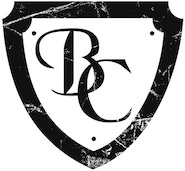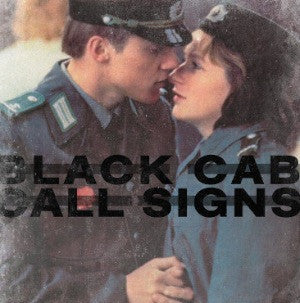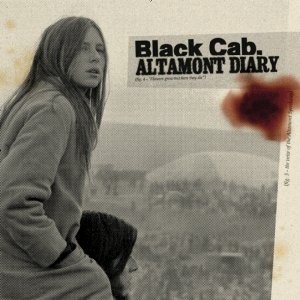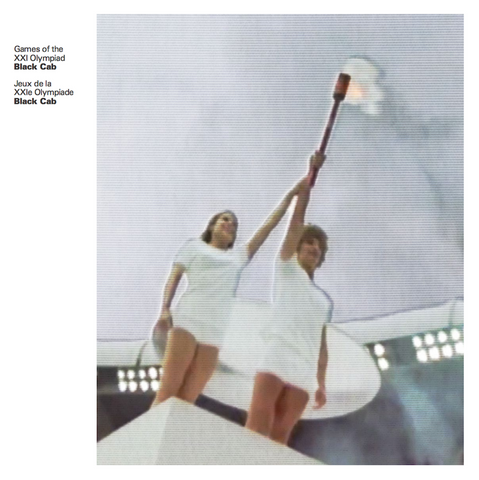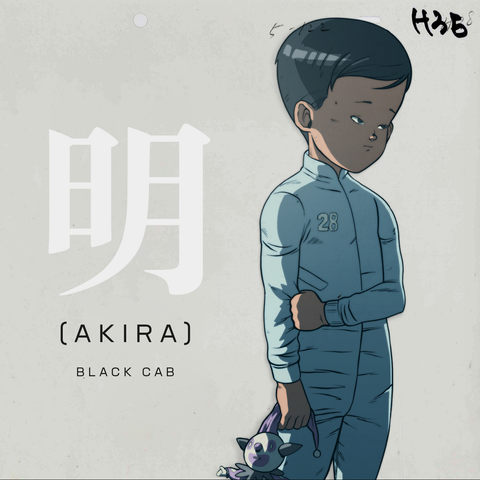Call Signs (CD)
$20.00
Third album from Black Cab released in 2009.
- Call Signs 0:21
- Church In Berlin 4:49
- Rescue 4:45
- Fates 1:01
- Black Angel 4:07
- Dresden Dynamo 3:32
- Lost & Falling 4:58
- Sonnenallee 5:59
- Wires 1 1:25
- Ghost Anthems 3:45
- After the War 5:01
- Wires 2 0:30
- Sword & Shield 4:48
Or buy digital;
Reviews for Call Signs
"****Melbourne shoegazers hit jackpot with cinematic third album "Following two acclaimed albums in Altamont Diary and Jesus East, Ride/Catherine Wheel-loving Melbournians Black Cab mix and stir their signature ingredients Ð swirling wall-of-sound guitars, echo-drenched vocals, laidback finger-picking and shimmering electronica flourishes Ð to neo-shoegaze perfection on LP number three Call Signs. The collective's previous German stints mean there are pronounced Teutonic overtones present on the detached Church In Berlin and oscillating, Tangerine Dream-like instrumentals Dresden Dynamo and Sonnenallee, while the acoustic slide-underscored Black Angel practically outshines nearly everything on BRMC's Howl. As far as the droning guitar halo travels, Rescue, and After The War all outdo each other in the buzz & fuzz stakes and when the said halo slows down and disperses, we get miniatures Fates and the two-part Wires, both being concise mood pieces par excellence. There's even a towering, near-Gregorian chant epic in Lost & Falling; Died Pretty's Ron Peno takes lead vocals on the haunting Ghost Anthems and piano ballad Sword & Shield rounds off the collection in a sublime fashion. Better still, the CD artwork Ð two military uniform-clad lovers locked in a fond embrace Ð oozes more Eastern Bloc chic than a dozen select Soviet movies (and this humble writer can attest he's seen more than a few in his lifetime). Just plain damn cool Ð from reverb and delay pedals with love."
- Denis Semchenko/Rave Magazine/August 2009
"Black Cab has a habit of building albums around a central idea. 2004's Altamont Diary scanned the curdled finale of the Stones' infamous 1969 show, whereas 2006's Jesus East cast an ear to sitars, tablas and other droning instruments of India. Call Signs finds inspiration in the imposing government surveillance of 1970's East Germany. While the Melbourne band (singer/programmer Andrew Coates and guitarist James Lee, plus a bevy of collaborators) hesitate to call it concept album, the opening title track features era-authentic radio signals and messages, and Call Signs' working title was 'Church In Berlin' (also the name of a song here). It's a testament to Black Cab's moody prowess that Call Signs isn't bogged down by that dour premise. If anything, it's a cozy fit with the album's late-night fog of cascading delay, layered background noise, glistening guitars and Coates' drowsy baritone. Pitched between M83's gasping synth soundscapes and Mogwai's inky instrumental workouts, these songs mine shoegaze, psych and post-rock earmarks while maintaining, at times, the drive of a pop single. There are also a few interludes acting as segues or change-ups between the album's varying gears. 'Church In Berlin' and 'Rescue' are strong early cuts, the latter churning its bass line for all it's worth. Further along, 'After The War' splashes melodies over taut drums and 'Lost & Falling' positions stalactites of synths alongside squiggles of guitar. Heavily treated and sung as if sharing a state secret, Coates' vocals can be hard to make out, and sometimes they seem more for effect than as a vehicle for lyrics. That makes the presence of instrumentals quite natural: 'Dresden Dynamo' is set to burping keys and sampled voices, while 'Sonnenallee' comes off sounding like a club remix with its big beats. Despite how well Black Cab applies shadows and intrigue, some of Call Signs' most arresting moments arise from clear vocals and lyrics. The best, 'Black Angel', is a homage to the late American folk singer Judee Sill, who's the subject of a new US tribute album called Crayon Angel. It samples her spoken voice - Coates sings as well - and its folk gait was clearly inspired by her, although it could also be read as a return to some of the band's past country-psych influences. There's a wonderfully sour keyboard part, and Sill's voice is handled in a similar manner to Iggy Pop's in Mogwai's 'Punk Rock'. Died Pretty singer Ron Pero lends trawling lead vocals to 'Ghost Anthems', made triumphant with building drums and horn-like synths, but the closing 'Sword & Shield' includes Coates' singing at its least obscured. Moping with considerable elegance over guest Matt Vehl's piano, he seems confident in his voice only with the knowledge that the album is almost done. That's not a flaw; Black Cab delves so intently into effects and programming that it's pointless to imagine the songs without them. This is the band's trademark sound after all, and it's all the headier for its concentrated, tarry consistency.."
- CR, Doug Wallen/Mess and Noise/ August 2009
"***** This concept album reflecting the romantically artistic contrasts of Berlin circa 1970 excites the cockles of this music lover's heart. While not a new ideal (they previously released an interpretation of 1969's Altamont tragedy), this is frighteningly realised and accurate, with the excitement one feels when artistically out of depth. Abrasive washes of fuzz and repetition, moments of horn-rimmed intelligence; there's even a track with Ron Peno (Died Pretty) that inspires you to rip the throat from commercial radio who never gave him the recognition. Cool, moody and reeking of an old Gitanes box left by Bowie and Iggy."
- Chris Murray, Music Australia Guide Sept 2009
"It's been eighteen years since a crowd of excited German youths did what a combination of western diplomacy and free market rhetoric had failed to achieve - brought down the wall that separated West and East Berlin. With that egregiously symbolic moment came the catalyst for the gradual extinction of the icons of the totalitarian East German state - the neo-Orwellian propaganda, emotionless uniform-clad representatives of a ubiquitous police force, androgynous, steroid pumped sports stars and dour post-Bauhaus architecture with the artist vibrancy of a concrete slab. It's within that distant cultural and political climate that Black Cab have decided to locate its latest musical opus, Call Signs. Having celebrated and critiqued Ô60s idealism in Altamont Diaries, and followed that idealism to its eastern fringes on Jesus East, James Lee and Andrew Coates, the protagonists who breathe the artistic life into the Black Cab concept, have now turned their focus to the suppressed beauty of the East German state. The country's totalitarian existence is conveyed in the simple tones of the 20 second opening title track; the rhythm and precision of Church In Berlin falls perfectly in line with the paradox of Soviet realist art, where the smiling faces of humanity both reinforce and undermine the state sanctioned discourse. Rescue is the proverbial call for help, its pace ebbing and flowing like the human spirit trying to find voice in a dysfunctional cultural landscape. The bleakness of Fates suggests the state has triumphed over that spirit; the Simon and Garfunkel idealistic folk sensibility of Black Angel (a tribute to '70s folk singer Judee Sill) indicates that the war is far from over. Dresden Dynamo sidles into aural view with the enigmatic presence of a Stasi secret agent eavesdropping on a couple of would-be insurgents; Lost And Falling is dark and threatening, like the cold concrete walls of the military cell to which insurgents were regularly condemned - yet, it's with James Lee's guitar that the light that still shines through when hope is all but lost, can be seen. The electronic beats of Sonnenalee could be a confused wander against the tide of the regular daily routine; after the reprise of the minimalist tones of the opening track in Wires, Ron Peno (Died Pretty) adds his typical personal touch to the intense pop-tinged hard-rock of Ghost Anthems. After The War is the calm after the storm of questioning and revolt; Sword And Shield is a sparse statement of romance found amid the ruins of brutal ideological institutions. Love, it seems, can still conquer many things. That there now exists a level of nostalgia for the halcyon days of communist rule says much for the capacity of humanity to ignore the pain of the past when confronted by contemporary socio-economic difficulty. Call Signs isn't a tool of myopic nostalgia Ð the bleakness of the industrial, political and cultural landscape constructed across the album is as obvious as the corruption of the Olympic ideals by the East German sporting machine - but it is a salient reminder that beneath the suffocating discourse and bland architecture lies heart, soul and artistic quality. And Black Cab know where to find it."
- Patrick Emery, Beat Magazine. Sept 2009
"On their first two albums, 2004's Altamont Diary and 2006's Jesus East, Melbourne's Black Cab (vocalist Andrew Coates and guitarist James Lee) approached rock'n'roll as a kind of death trip: they tapped into the post-psychedelic heaviness prevalent at the end of the 1960s. If those records had a certain cathartic glamour, their new disc inhabits a murkier landscape. Call Signs, inspired in part by Anna Funder's collection of collaborator's tales Stasiland, is centred on the East Germany of the 1970s, a country where the state's security apparatus was omniscient. There's a latent strain of paranoia in most pop music but it exists on a personal level. Call Signs recasts that mood on a national scale - foreboding rises up from the opening Church in Berlin, with Coates's stentorian cadence circling the guitars. Backed by electronic programming that suggests surveillance, the songs divide between laments for compromised individuals and invocations of the all-powerful system. It's a powerful work of post-punk atmospherics - play it back-to-back with Florian Henckel von Donnersmarck's film 'The Lives of Others'."
- Craig Matheson, Sydney Morning Herald. 15th Aug 2009
"4.5 stars. Melbourne's Black Cab deliver their third studio album, a dark and loosely romantic journey through rock and electronic beats inspired by 1970s East Germany. Call Signs is as chilling as an Eastern Bloc history lesson, resting its heavy soul on mournful beats and a minimalist rock energy. It pulls its inspiration from the likes of Bauhaus and Suicide. Steered by the talented vocalist and programmer Andrew Coates and guitarist James Lee, a host of musical identities including drummer Richard Andrew (Registered Nurse), bassist Anthony Paine (High Pass Filter), guitarist Alex Jarvis (Alex Jarvis Band) and programmer Steve Law (Zen Paradox) keep this brooding musical trip intact. Rescue is a great track, loaded with haunting vocals and swirling guitars with feedback while Dresden Dynamo makes the most of synthesiser beats. In a nutshell, this is a winner."
- Jane Rocca, The West Australian. 13th Aug 2009
